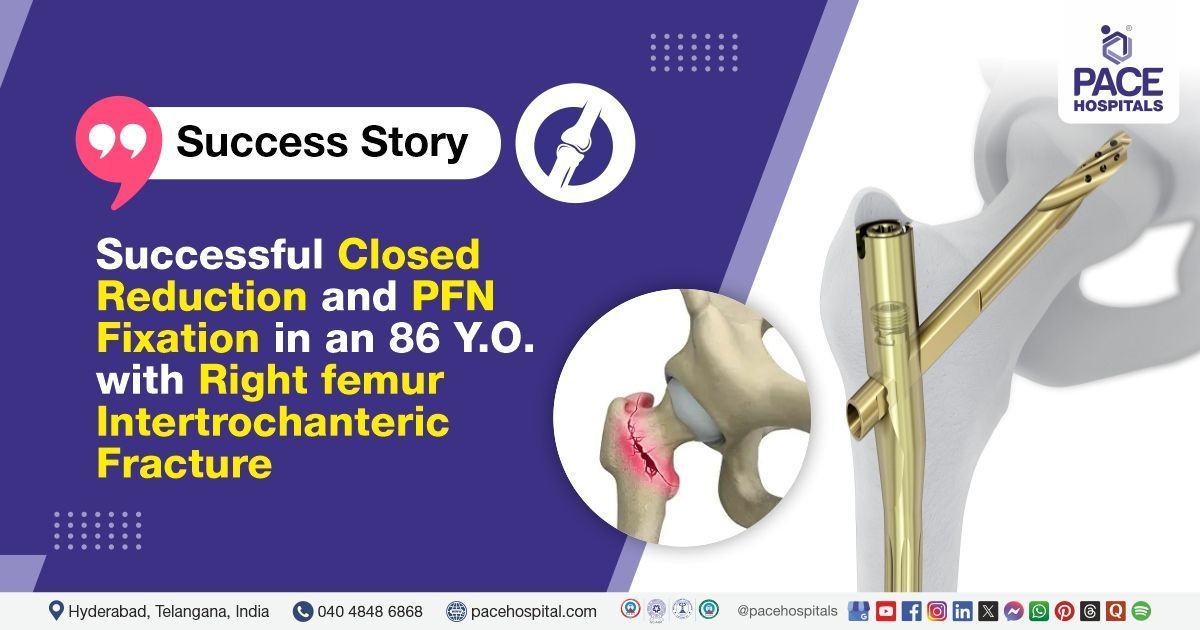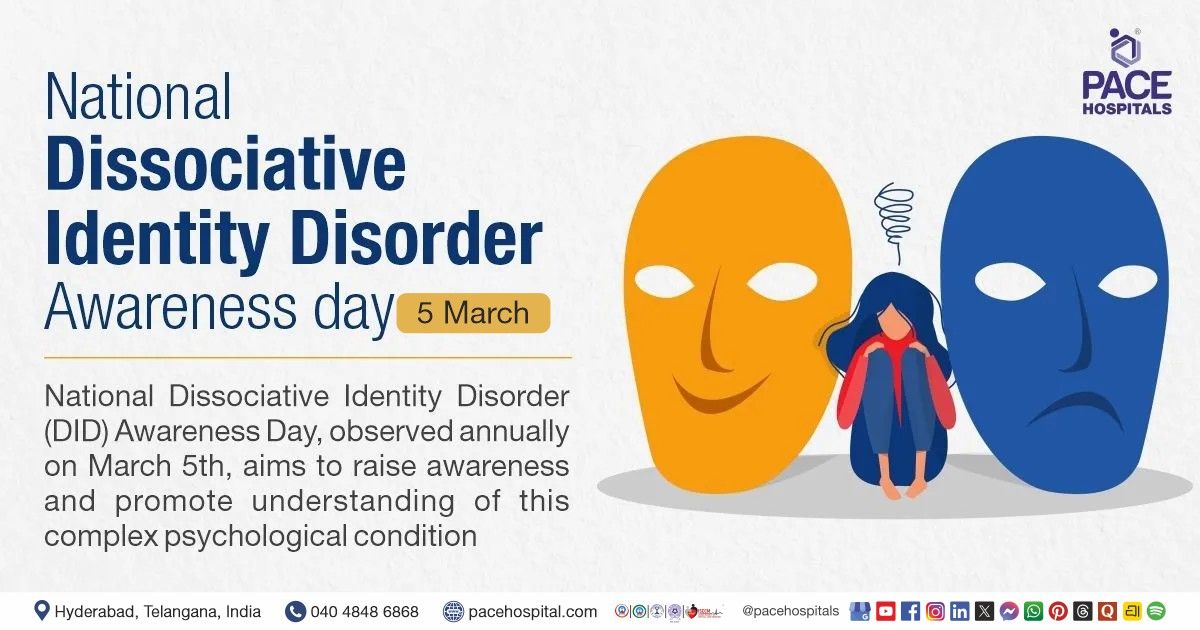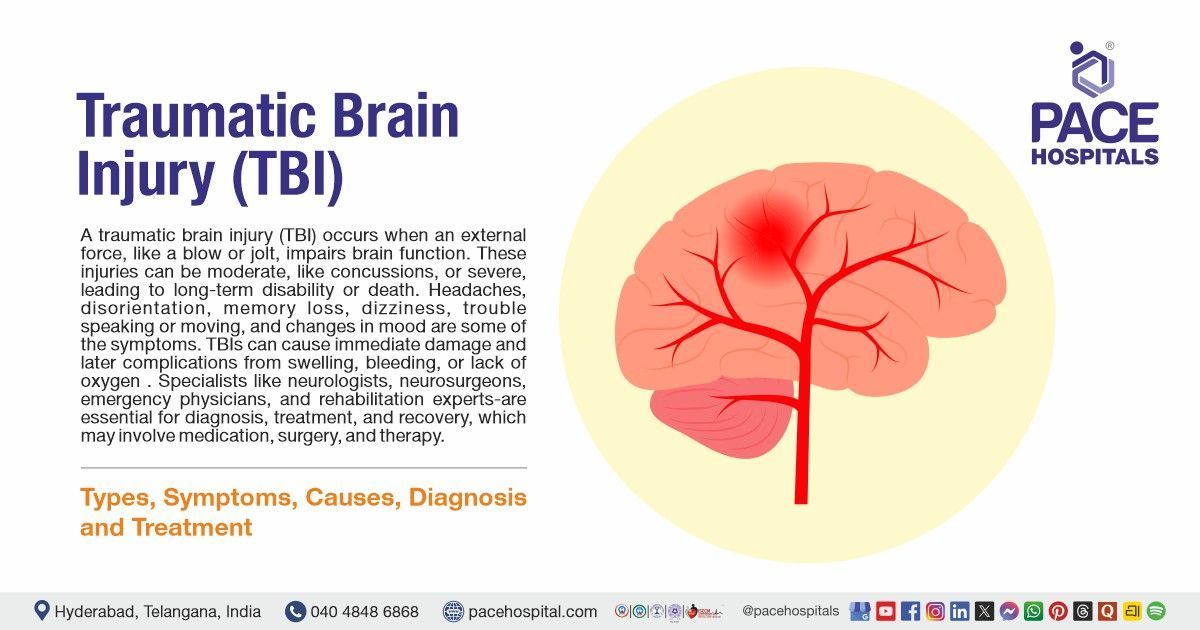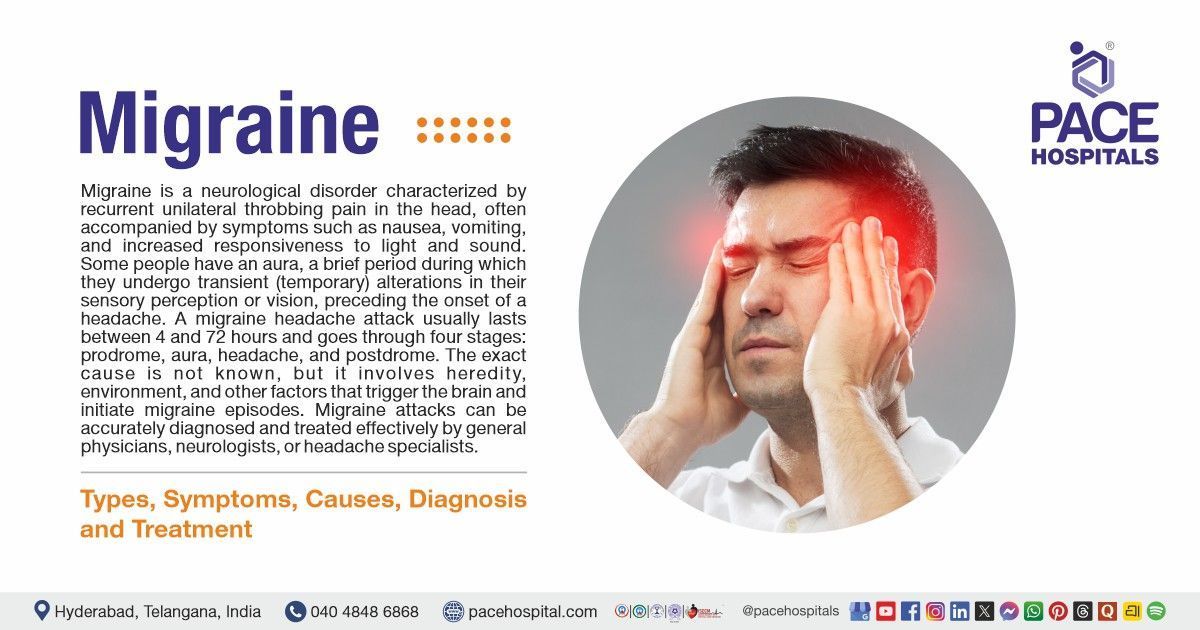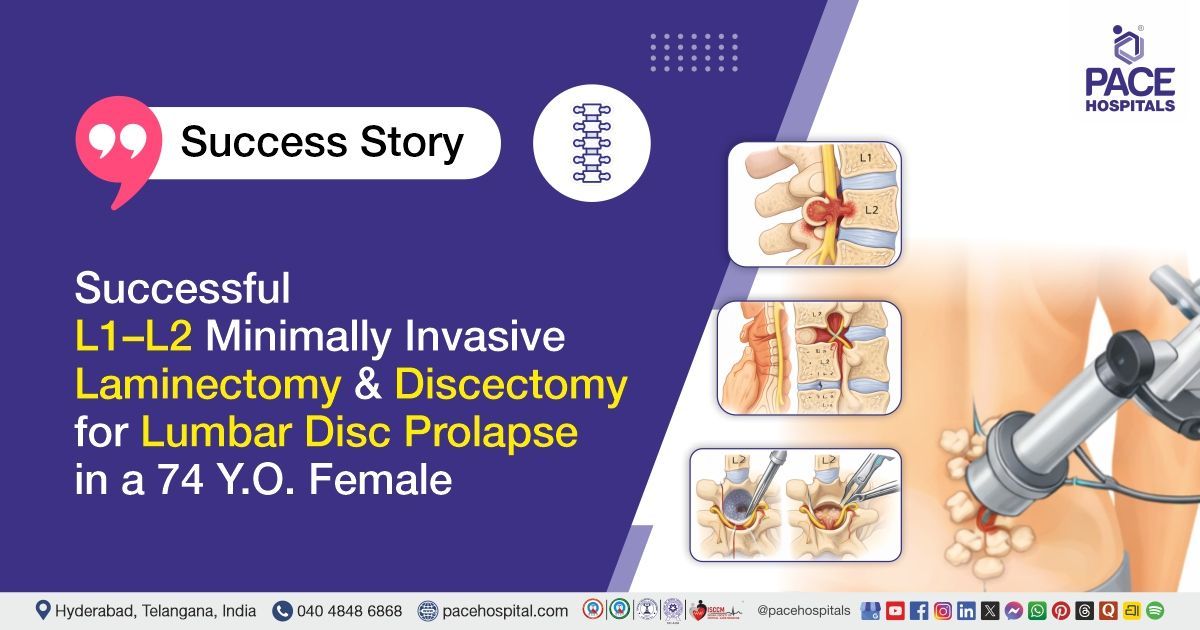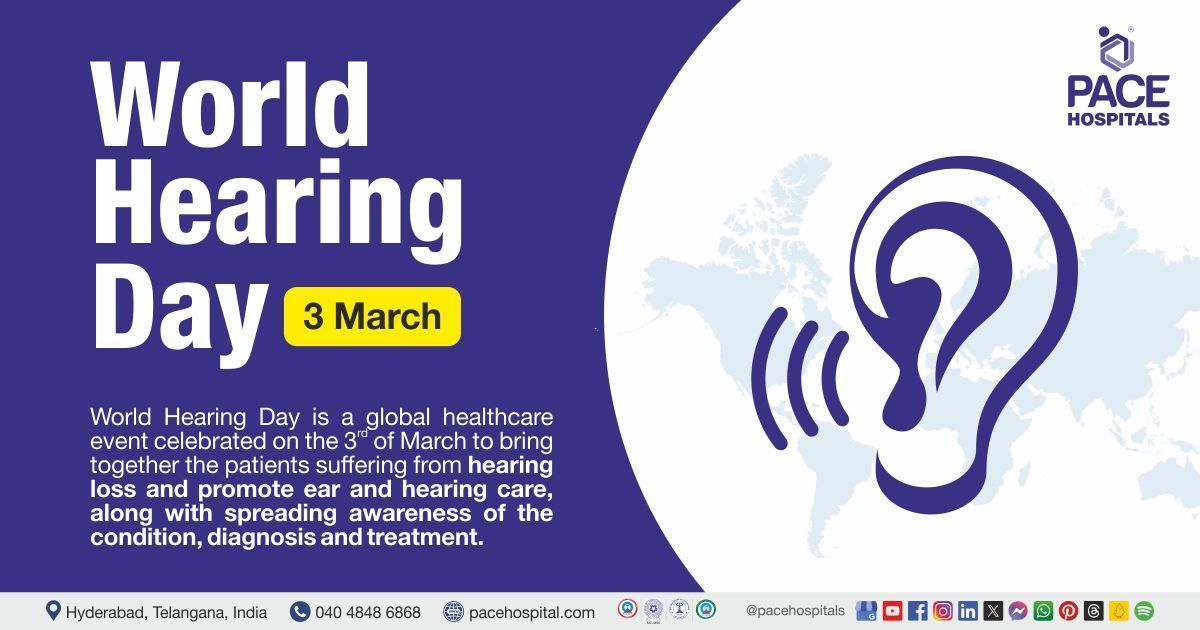Successful Closed Reduction & PFN Fixation in an 86-Y.O with Femur Intertrochanteric Fracture
PACE Hospitals
PACE Hospitals' expert Orthopaedic team successfully performed a Closed Reduction and Proximal Femoral Nail (PFN) Fixation
on an 86-year-old female patient who had presented with right hip pain and difficulty in walking following a slip and fall at home. The patient had experienced pain in the right lower limb, which had limited her mobility. The procedure was performed to stabilize the femoral fracture, alleviate pain, and restore her ability to walk, thereby improving her overall function and quality of life.
Chief Complaints
A 86-year-old female patient with a
body mass index (BMI) of 21.2 presented to the Orthopedics Department at
PACE Hospitals, Hitech City, Hyderabad, with complaints of pain in the right lower limb and difficulty walking following a slip and fall at home. There was no history of loss of consciousness or syncopal episode at the time of the fall.
Past Medical History
The patient had no known history of hypertension or diabetes, which was considered clinically favorable, as the absence of these comorbidities reduced the risk of intraoperative and postoperative complications and supported a smoother, more stable recovery. Additionally, the patient had no known food or drug allergies.
On Examination
On examination, the patient was conscious and coherent. Vital signs were stable. Local examination revealed tenderness and swelling over the right hip, along with an external rotation deformity of the right lower limb. The range of motion at the right hip was painfully restricted, and no distal neurovascular deficits were noted. Systemic examination showed normal findings. The cardiovascular system had normal heart sounds, the central nervous system showed no focal neurological deficits, and the respiratory system had clear bilateral air entry with normal breath sounds. The abdomen was soft, non-tender, and without organomegaly.
Diagnosis
Upon admission to PACE Hospitals, the patient underwent a thorough evaluation, including a review of her medical history and a detailed clinical examination by the orthopedic team. Given her symptoms ,there was a strong suspicion of an intertrochanteric fracture of the right femur.
The patient underwent an X-ray of the pelvis and right hip, which confirmed an intertrochanteric fracture of the right femur. A CT scan was performed for a detailed assessment of the fracture pattern and surrounding bone structures. Laboratory investigations were conducted, including a complete blood count (CBC) to check hemoglobin levels, thyroid-stimulating hormone (TSH) to assess thyroid function, serum electrolytes (sodium, potassium, chloride), urine osmolality with sodium and potassium levels, random blood glucose, and renal function tests including urea. Additionally, preoperative assessments such as an electrocardiogram (ECG) and chest X-ray were carried out to evaluate cardiac and respiratory status before surgery.
Based on the confirmed diagnosis, she was advised to undergo a
Right Intertrochanteric Fracture Treatment in Hyderabad, India, under the care of the Orthopedic Department, ensuring comprehensive management.
Medical Decision Making
After consultation with Dr. Raghuram, Consultant Orthopaedic Surgeon, a comprehensive evaluation was conducted to determine the appropriate diagnosis and treatment plan for the patient’s right hip injury. Based on detailed clinical examination and imaging studies, including X-ray and CT scan of the right hip, surgical intervention was deemed necessary.
It was determined that the patient had a right intertrochanteric fracture, which was causing pain and difficulty in walking. Closed reduction and proximal femoral nail (PFN) fixation were identified as the most effective interventions to stabilize the fracture and restore mobility.
The patient and her family were informed about her condition, the procedure, its associated risks, and its potential to alleviate symptoms and enhance her quality of life.
Surgical Procedure
Following the decision, the patient was scheduled to undergo Closed Reduction and Proximal Femoral Nail (PFN) fixation surgery in Hyderabad at PACE Hospitals, under the expert care of the Orthopaedic Department.
The following steps were carried out during the procedure:
- Preoperative Preparation: The patient is positioned supine on a fracture table under spinal anesthesia. The affected limb is cleaned and draped under sterile conditions. Traction is applied to the limb to aid in fracture reduction.
- Closed Reduction of the Fracture: Using fluoroscopic guidance (C-arm), the surgeon manipulates the limb to align the fractured bone fragments without making an open incision. Reduction is confirmed in multiple views (anteroposterior and lateral) to ensure proper alignment.
- Incision and Entry Point Preparation: A small incision is made proximal to the greater trochanter. The entry point for the PFN is identified using fluoroscopy, typically at the tip of the greater trochanter or slightly medial. A guide wire is inserted into the femoral canal, ensuring correct alignment.
- Insertion of the Proximal Femoral Nail: Over the guide wire, the proximal femoral nail is inserted carefully into the femoral shaft, maintaining fracture reduction. Positioning is checked repeatedly with fluoroscopy to avoid malalignment or damage to surrounding tissues.
- Screw Fixation and Closure: Once the nail is in place, screws are inserted through the nail into the femoral head and neck to secure the fracture fragments. Final fluoroscopic images confirm proper implant placement and fracture stabilization. The incision is closed in layers, and sterile dressing is applied.
Postoperative Care
The postoperative period was uneventful. The patient received intravenous analgesics, antibiotics, and supportive care. During the hospital stay, the physiotherapy team assisted the patient with bed mobilization and helped her sit up. The patient was discharged in a hemodynamically stable condition with prescribed medications and instructions for care.
Discharge Medications
Upon discharge , the patient was prescribed a proton pump inhibitor to reduce stomach acid, a broad-spectrum antibiotic to prevent infection, and an antiemetic to control nausea. Additionally, an antiplatelet agent was prescribed to prevent blood clots, a nutritional supplement to support recovery, and a vitamin C supplement to promote healing.
Emergency Care
The patient was informed to contact the emergency ward at PACE Hospitals in case of any emergency or development of symptoms such as fever, abdominal pain, and vomiting.
Review and Follow-up Notes
The patient was advised to return for a follow-up visit with the Orthopaedic Doctor in Hyderabad at PACE Hospitals after 5 days for further evaluation.
Conclusion
This case highlights the effective management of the right intertrochanteric femur fracture in an elderly patient through timely surgical intervention using closed reduction and PFN fixation. Comprehensive postoperative care and early physiotherapy support contributed to improved mobility and overall clinical stability.
Optimizing Recovery in Elderly Hip Fractures Through Timely Surgery
This case highlights the effective management of the right intertrochanteric femur fracture in an elderly patient through timely diagnosis and surgical fixation. Closed reduction and proximal femoral nail (PFN) fixation provided stable internal support, enabling early mobilization with minimal surgical trauma. Comprehensive preoperative evaluation ensured the patient was medically fit, and the absence of comorbidities contributed to a smoother postoperative course. Multidisciplinary care, including expert the
orthopedic doctor / orthopedic surgeon intervention and physiotherapy support, facilitated early rehabilitation and reduced the risk of complications. Pain control, infection prevention, and guided mobilization were key aspects of recovery. This case underscores the importance of prompt, coordinated care in improving outcomes and functional independence in elderly fracture patients.
Share on
Request an appointment
Fill in the appointment form or call us instantly to book a confirmed appointment with our super specialist at 04048486868

